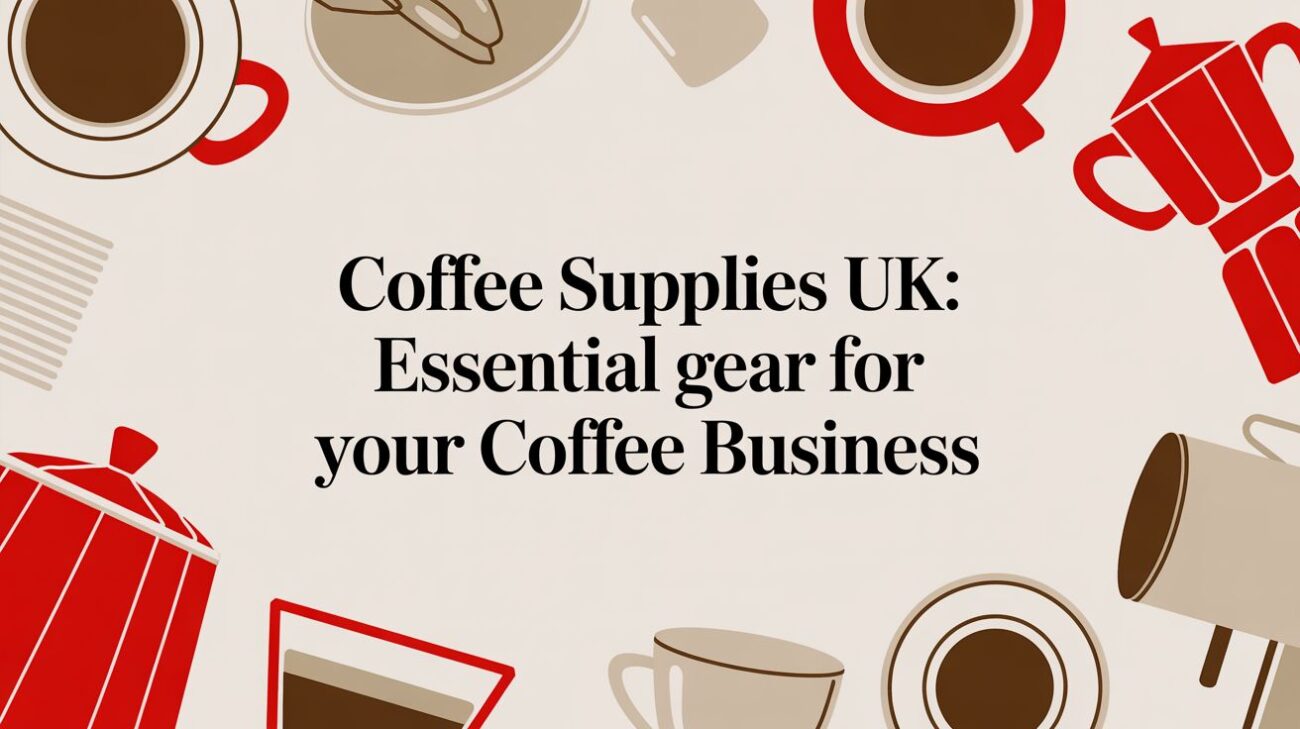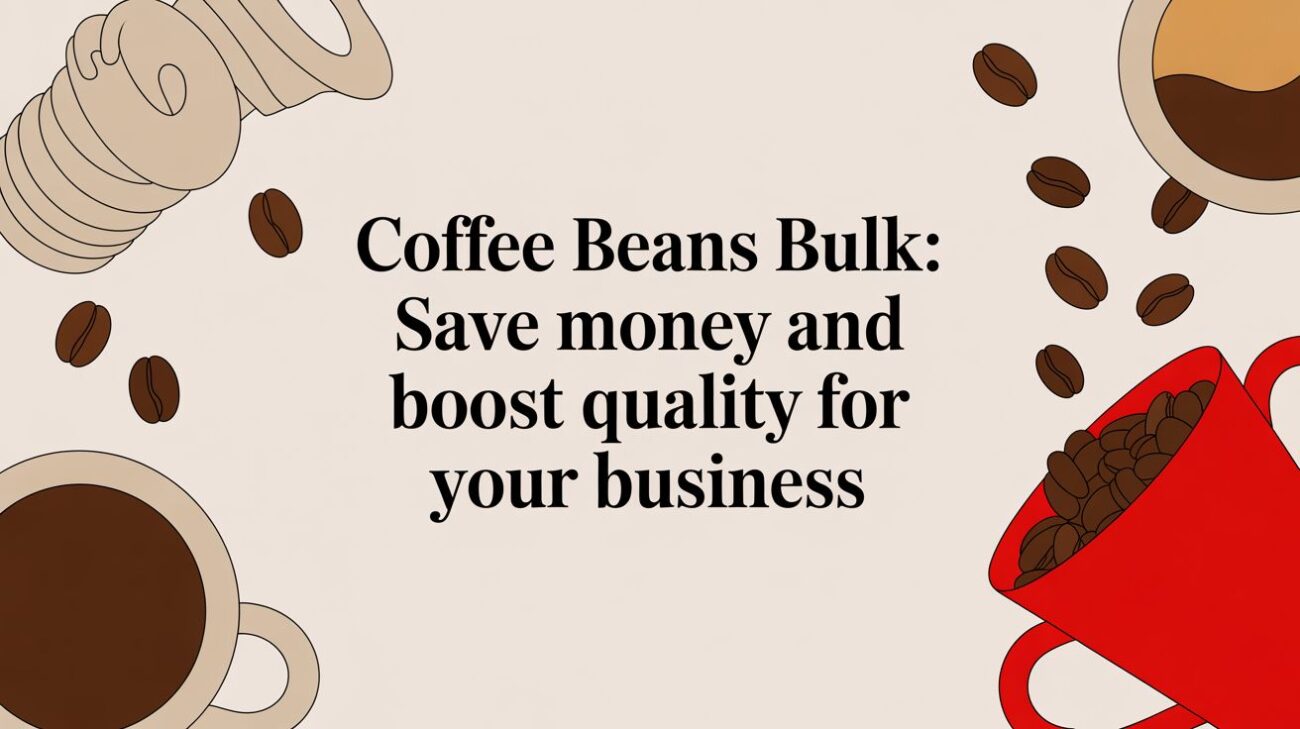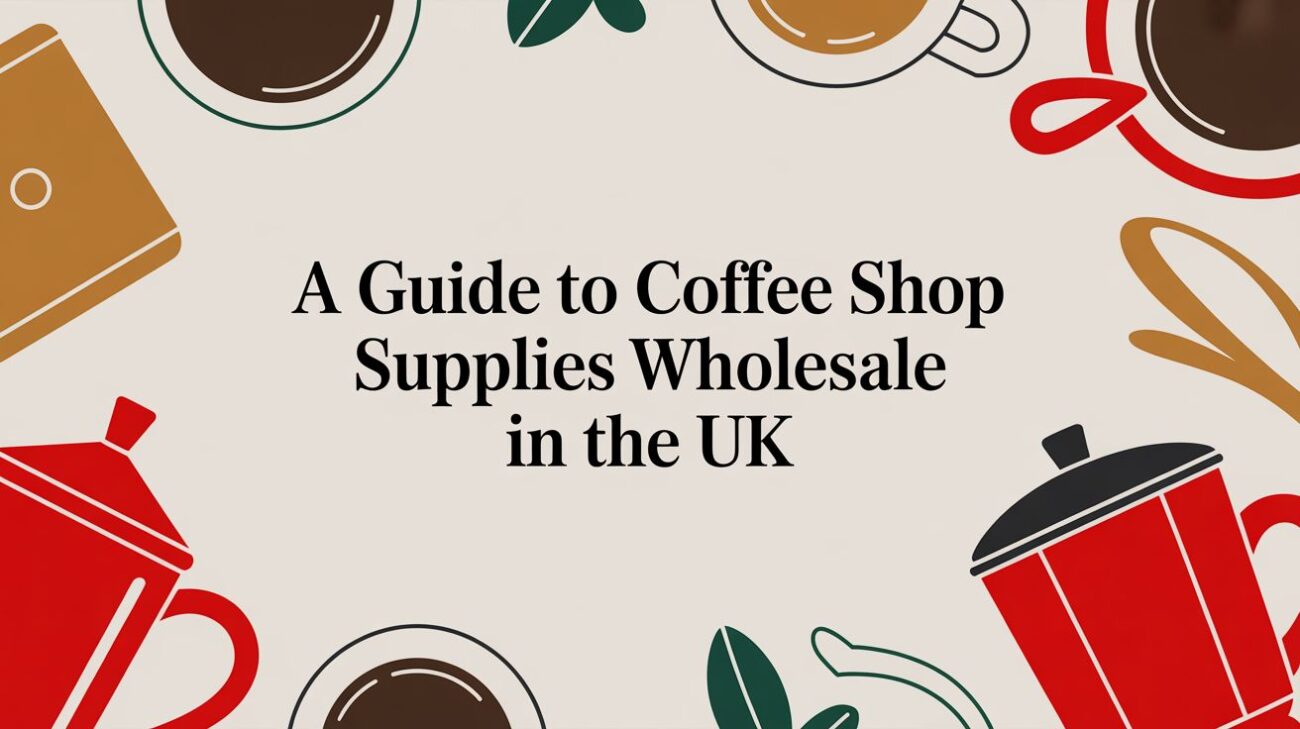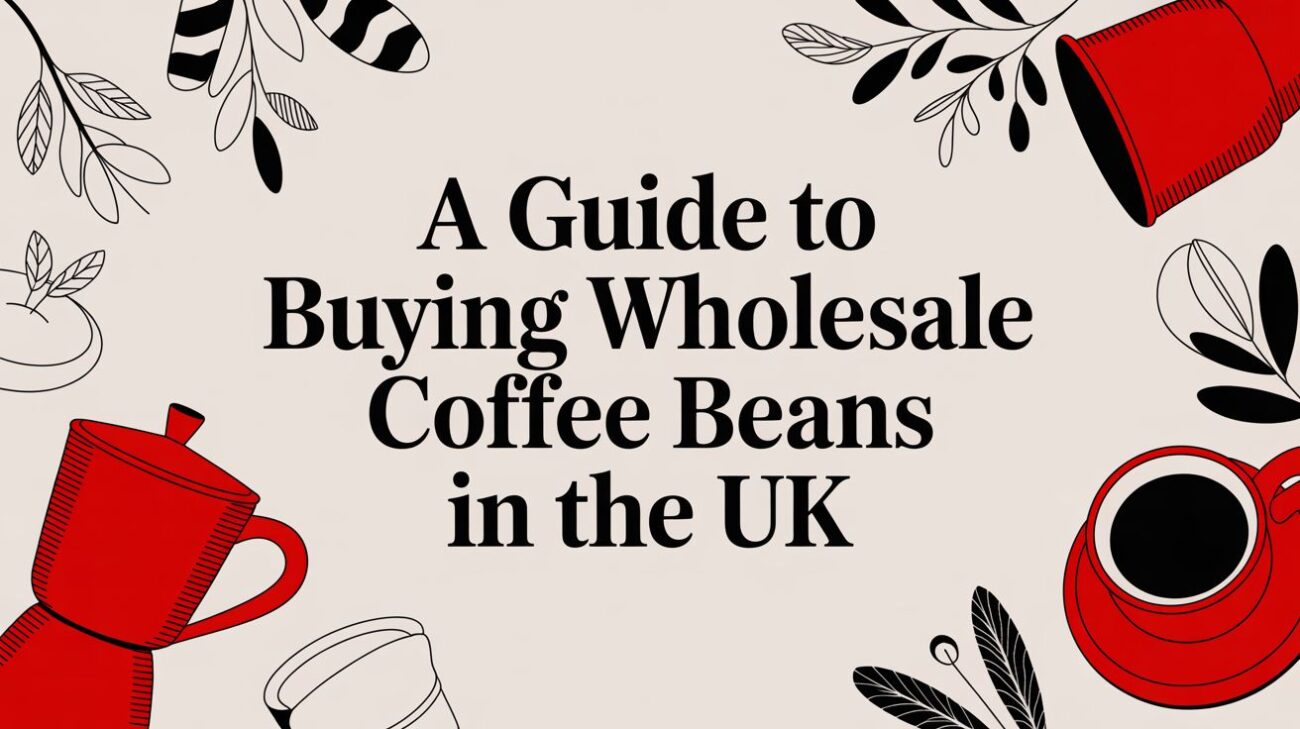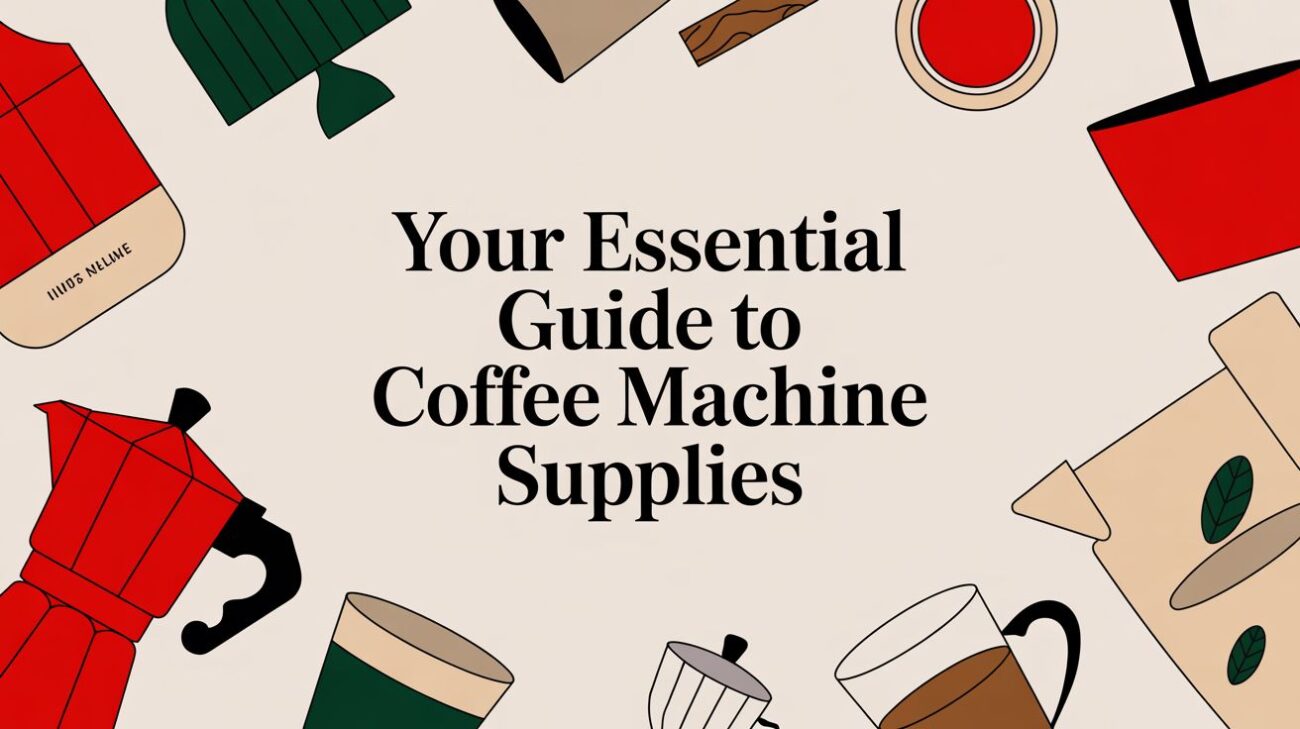Buying coffee beans in bulk is a smart move for any business or serious coffee lover. It’s the most effective way to reduce your cost per cup and ensure a consistent, high-quality supply of your favourite coffee. This simple shift in purchasing can transform your budget and the quality of every brew.
For businesses, this means healthier profit margins. For home enthusiasts, buying coffee beans in bulk makes premium coffee an affordable, everyday luxury. Let’s explore how to get it right.
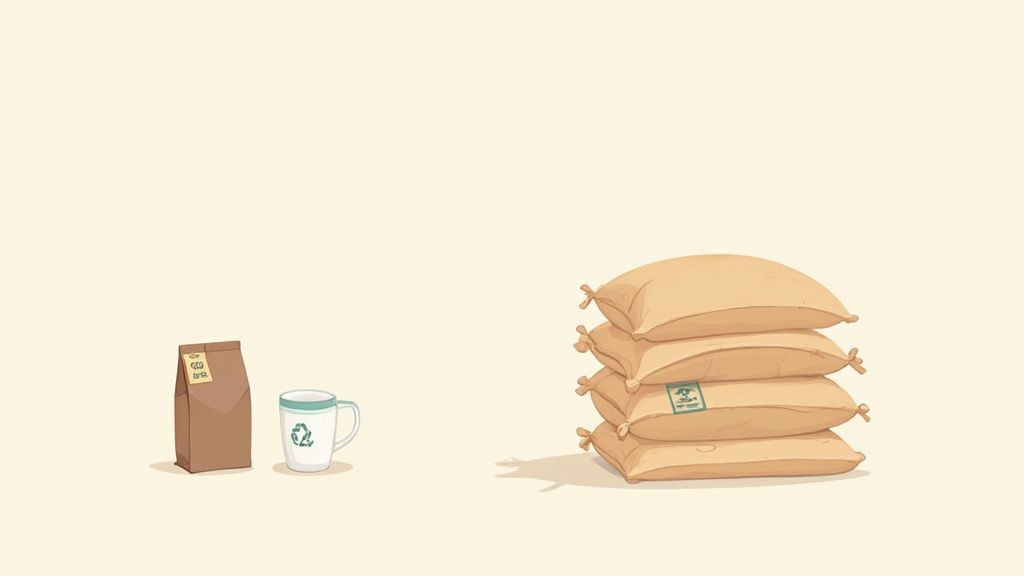
alt text: An illustration of large coffee sacks, a reusable coffee cup, and a small retail coffee bag, representing the shift to buying coffee beans in bulk.
Why is Buying Coffee Beans in Bulk a Smart Move?
For cafés, offices, and dedicated home baristas, the logic behind buying coffee beans in bulk is compelling. The decision impacts everything from daily running costs to the final quality of the coffee in the cup. When you move from small retail bags to larger quantities, you unlock benefits that go far beyond a lower price tag.
This approach is becoming increasingly popular in the UK. Businesses and consumers who buy in bulk often lock in prices 10-15% below standard retail rates, a significant saving for anyone ordering substantial quantities.
The Financial Benefits
The most obvious win is the financial saving. Suppliers offer significant price breaks per kilo as your order volume increases. This makes sense for them—larger orders mean less administration, packaging, and shipping, and they pass these savings on to you.
For a business, this reduction directly boosts profit margins on every coffee you sell. For a home user, it means the cost per cup plummets, making high-quality, ethically sourced beans a more sustainable daily habit. The initial outlay is higher, but the long-term savings are substantial. You can learn more about how stocking up saves you money in our detailed wholesale guide.
Unwavering Consistency and Quality
Consistency is the cornerstone of any great coffee experience. When you buy beans in small, frequent batches, you risk slight variations from different roast dates or even different lots of green beans.
By purchasing a larger quantity from a single roast batch, you guarantee a consistent flavour profile for weeks or even months. This is critical for a café aiming to build a loyal customer base who return for the same reliable espresso day after day.
Convenience and Eco-Friendly Perks
Fewer orders mean less time spent on purchasing and significantly less packaging waste. For a busy café manager, reducing admin frees up valuable time for other crucial tasks. For a home brewer, it means a well-stocked pantry and no more last-minute dashes to the shop.
From an environmental standpoint, one large bag generates far less waste than dozens of smaller ones. This aligns perfectly with growing consumer demand for sustainable practices, helping you reduce your carbon footprint one cup at a time.
Bulk Buying Benefits at a Glance
| Benefit | For Cafés & Businesses | For Home Baristas |
|---|---|---|
| Cost Savings | Significantly lower cost per kilo, boosting profit margins on every cup sold. | Reduces the price per cup, making premium coffee more affordable for daily brewing. |
| Quality Control | Guarantees a consistent flavour profile from a single roast batch, crucial for customer loyalty. | Ensures the same great taste every morning for weeks, without roast-to-roast variation. |
| Time Efficiency | Fewer orders to place and manage, freeing up time for operations and customer service. | Less frequent shopping trips and a well-stocked pantry for ultimate convenience. |
| Environmental Impact | Drastically reduces packaging waste and the carbon footprint from multiple deliveries. | Less packaging waste compared to buying multiple small retail bags over time. |
How to Calculate Your Coffee Needs
Working out how many coffee beans to order is a crucial step. Order too little, and you risk running out during a busy service. Order too much, and your beans will lose their vibrant, complex flavours before you can use them.
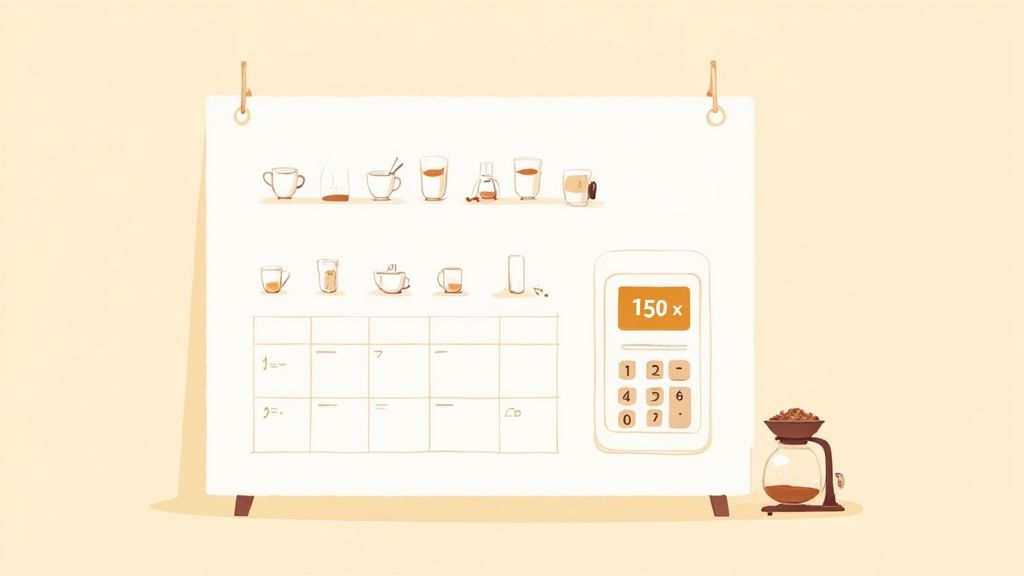
alt text: A chart showing different coffee brewing methods and a calculator, illustrating how to calculate coffee consumption for bulk buying.
This balancing act isn’t guesswork; it’s a simple calculation. Whether you’re running a bustling café or keeping your home supply fresh, forecasting your needs is straightforward once you know the key variables.
Forecasting for Cafés and Businesses
For any commercial operation, your calculation should be based on real sales data. Start by finding your average daily number of coffees sold, accounting for busy weekends and quieter weekdays to get a realistic weekly average.
Next, you need to know the weight of your standard espresso shot, often called the dose. Most speciality cafés in the UK use a dose between 18g and 20g for a double espresso, which forms the base of most coffee menu items.
Finally, you must factor in waste. This includes coffee used for dialling in the grinder each morning, shots that don’t pull correctly, and beans used for staff training. A good rule of thumb is to add a wastage buffer of 10-15% to your total.
Example Café Calculation:
- Daily Coffees Sold: 150
- Dose Weight: 18g per double espresso
- Wastage Allowance: 15%
Formula: (Daily Coffees Sold x Dose Weight) + Wastage % = Total Daily Grams
- Calculate daily bean use: 150 coffees x 18g = 2,700g (2.7kg)
- Add the wastage buffer: 2,700g x 0.15 = 405g
- Find your total daily need: 2,700g + 405g = 3,105g (approx. 3.1kg)
- Calculate your weekly order: 3.1kg x 7 days = 21.7kg
Based on this, the café should order roughly 22kg of espresso beans each week. This keeps them comfortably stocked without the risk of beans going stale.
Calculating for Home Baristas
For home users, the process is much simpler but follows the same logic. It’s all about understanding your household’s daily coffee habits to establish a smart purchasing rhythm.
First, count how many coffees are made in your house each day. Then, determine how much coffee you use per cup, which varies by brew method.
- Espresso: Typically 18-20g per double shot.
- Pour-Over (V60, Kalita): Around 15-18g for a 250ml cup.
- Filter Machine: A good starting point is 60g per litre of water. For a high-volume option, our Summit Grande Crema Bulk Brew Filter Coffee is fantastic for larger batches.
- French Press: Roughly 15g for a 250ml cup.
Example Home Barista Calculation:
- Household Coffees: 3 per day
- Brew Method: Pour-over
- Dose Weight: 16g per cup
- Calculate daily use: 3 coffees x 16g = 48g
- Calculate weekly use: 48g x 7 days = 336g
- Calculate monthly use: 336g x 4 weeks = 1,344g (approx. 1.3kg)
In this scenario, buying two 1kg bags every six weeks would be a perfect schedule. This ensures the coffee is always enjoyed within its peak freshness window, which is typically 4-6 weeks after the roast date.
Choosing the Right Coffee Beans
Once you know how much coffee you need, it’s time for the best part: picking the beans. This decision is about more than just taste; it’s about matching the coffee’s character to your equipment, brew methods, and the people you’re serving.
Blends vs. Single-Origin Coffees
A coffee blend is a mix of beans from different origins, combined by a roaster to achieve a specific, consistent flavour profile. The goal is balance and reliability, making blends ideal for espresso.
A single-origin coffee comes from one specific farm, producer, or region. These beans showcase unique, distinct flavours, from the bright, fruity notes of an Ethiopian Yirgacheffe to the rich, chocolatey body of a Brazilian Santos.
- For cafés: A house blend is your workhorse, delivering the consistency customers expect. Offering a rotating single-origin as a guest espresso or for filter coffee is a great way to attract enthusiasts.
- For home baristas: This is down to personal taste. A 1kg bag of a favourite blend offers reliability, while smaller bulk amounts of single-origins are a fantastic way to explore the world of coffee.
Understanding Roast Profiles
The roast level completely changes a bean’s flavour, acidity, and body. Getting this right is crucial for your chosen brew method.
- Light Roast: These beans retain their original character, with higher acidity, a lighter body, and bright, floral or fruity notes. They are superb for pour-over or filter methods.
- Medium Roast: This is the sweet spot for many. These beans have a balanced profile with a fuller body and flavours leaning towards caramel, chocolate, and nuts. A medium roast is versatile and works well for most brewing methods.
- Dark Roast: These beans are oily, low in acidity, and have a heavy body. The dominant flavours come from the roasting process itself—think dark chocolate and smoke. They are traditionally used for bold espressos that cut through milk.
To learn more, read our guide on how to choose coffee beans, roast levels, and flavour notes.
Whole Bean Always Beats Pre-Ground
When buying in bulk, there’s one golden rule: always buy whole beans. Coffee’s aroma and flavour come from volatile compounds that disappear rapidly after grinding. Grinding massively increases the surface area exposed to oxygen, causing the coffee to go stale much faster.
Pre-ground coffee can lose as much as 60% of its aroma within just 15 minutes. A bulk purchase of pre-ground coffee is an investment in a stale, lifeless brew.
A quality grinder is just as important as the coffee itself. Grinding fresh right before you brew is the single best thing you can do to protect the flavour and guarantee a delicious cup every time.
How to Find the Best Bulk Coffee Bean Supplier
Choosing where you’ll be buying coffee beans in bulk is a major decision. Your supplier is more than a vendor; they’re a partner in quality, consistency, and reliability. A great supplier relationship ensures you always have fantastic, fresh beans when you need them.
Where to Find Reputable Suppliers
When sourcing wholesale coffee in the UK, your first port of call should be a supplier with a proven track record.
- ADS Coffee Supplies: For an unbeatable combination of an extensive range, rock-solid reliability, and exceptional customer service, we are a leading choice for businesses and serious home baristas alike.
- Local Roasters: These can offer unique, locally roasted coffee and a more personal relationship.
- National Distributors: Larger distributors provide a wide selection of brands and often have robust logistics networks.
How to Vet Potential Coffee Suppliers
Once you have a shortlist, it’s time to dig deeper. A great partnership is built on transparency and trust, so don’t be afraid to ask detailed questions.
Here are the key areas to focus on:
- Roast Date Transparency: Always ask for the ‘roasted on’ date, not a vague ‘best before’ date. Freshness is everything.
- Minimum Order Quantities (MOQs): Ensure their MOQs align with your usage. You don’t want to be forced into buying more beans than you can use while they’re fresh.
- Ethical Sourcing and Certifications: If certifications like Fair Trade or Organic matter to you, confirm they can provide beans that meet these standards.
- Delivery Reliability: Ask about their delivery network, lead times, and what happens if an order is delayed. For a deeper dive, check out our guide to wholesale coffee suppliers in the UK.
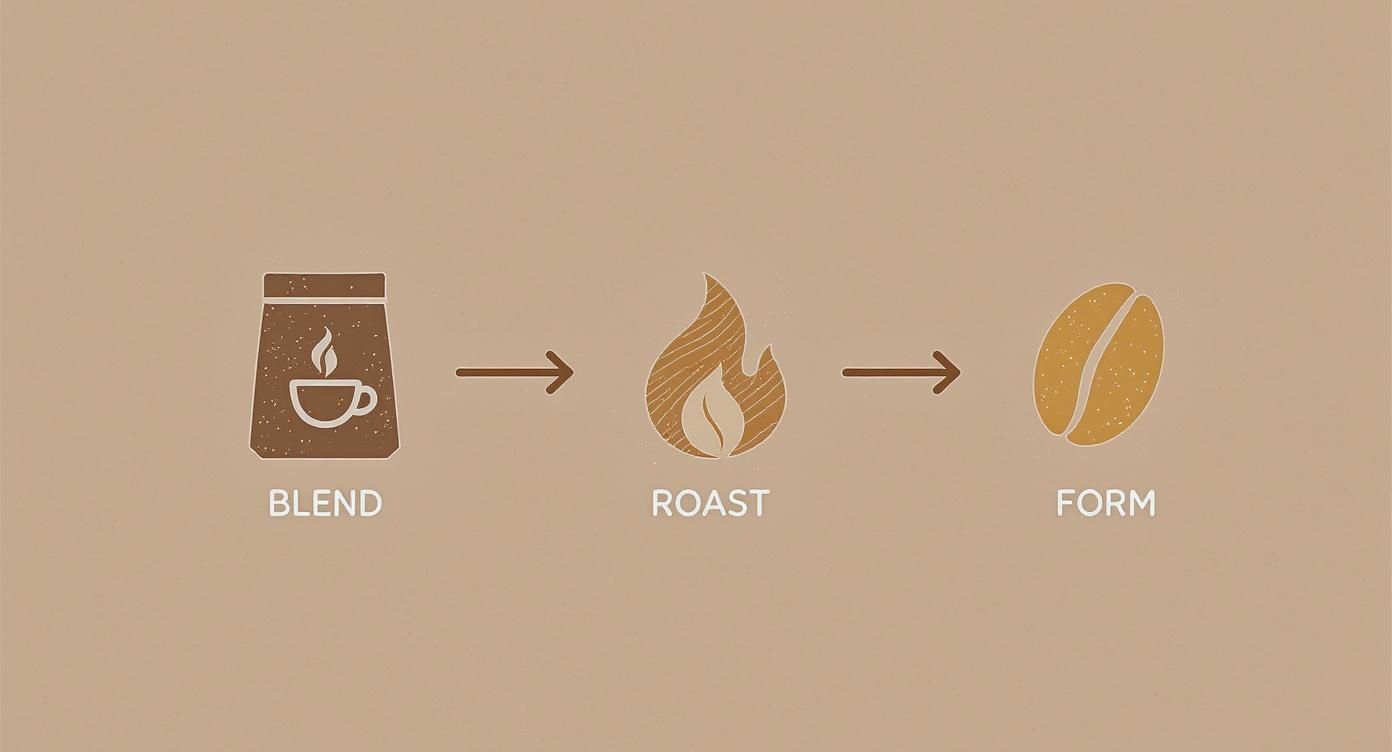
alt text: A diagram showing the coffee processing steps of blending, roasting, and selecting the final form (whole bean or ground).
Supplier Evaluation Checklist
Use this simple checklist to compare potential suppliers side-by-side.
| Evaluation Criterion | What to Look For | Why It Matters |
|---|---|---|
| Coffee Quality & Freshness | Samples, roast dates, clear flavour profiles. | The final taste in the cup is non-negotiable. |
| Pricing & MOQs | Transparent pricing, volume discounts, MOQs that fit your needs. | Ensures financial viability and prevents waste. |
| Reliability & Logistics | Consistent delivery schedule, clear communication. | A reliable supply chain is the backbone of your operation. |
| Support & Training | Access to expertise, barista training, equipment advice. | A great supplier invests in your success. |
| Ethical & Sourcing Claims | Certifications (Fairtrade, Organic), traceability. | Builds trust with consumers and aligns with brand values. |
The Importance of Sampling
Never commit to a large order without sampling first. Any reputable supplier will gladly provide samples. When you receive them, don’t just brew a quick cup—evaluate them properly.
Professionals use a process called ‘cupping’ to assess coffee objectively. Pay attention to the fragrance, aroma, flavour, aftertaste, acidity, and body. Taking structured notes helps you compare samples fairly and ensure the coffee lives up to its description.
For businesses dealing with very large volumes, some explore options like utilizing sourcing agents in China for direct green bean importing. However, for most UK businesses and home users, a trusted domestic wholesaler or roaster is the most practical choice.
How to Keep Your Bulk Coffee Beans Fresh
Buying in bulk is only a smart investment if the beans stay fresh down to the last scoop. To achieve this, you must protect your coffee from its four enemies: oxygen, light, heat, and moisture.
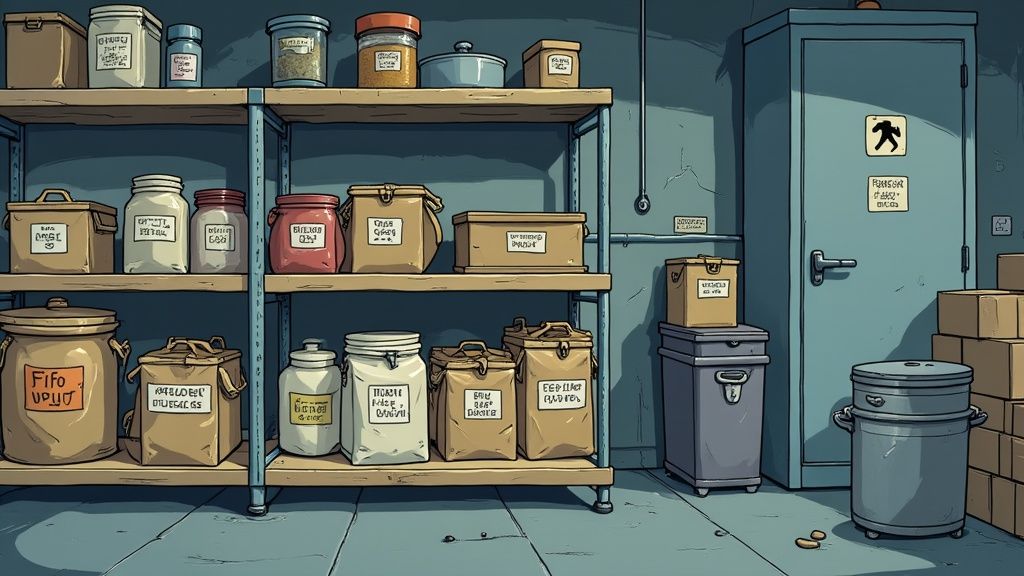
alt text: A well-organised storage room with shelves holding airtight containers, ideal for storing bulk coffee beans.
These four elements rapidly degrade the delicate oils and compounds that give coffee its flavour. Proper storage is essential to prevent the staling process and avoid a flat, lifeless brew.
Storage Solutions for Businesses
For any café or office, smart stock management is non-negotiable. A cool, dark, and dry stockroom is the ideal environment for your bulk coffee, away from direct sunlight and heat sources like ovens.
One of the most important systems to implement is ‘First-In, First-Out’ (FIFO). This simple stock rotation principle ensures older beans are always used before newer stock arrives. Label each container with the delivery date to make the process foolproof.
This habit prevents forgotten bags from going stale and guarantees your customers always get the freshest coffee possible.
Why One-Way Valve Bags Are Important
Those little plastic discs on coffee bags are one-way degassing valves. Freshly roasted coffee releases carbon dioxide (CO2), and this clever valve lets that CO2 escape without letting damaging oxygen get in. For this reason, you should keep your main supply in the original valved bag it came in, squeezing out excess air before resealing it.
Best Practices for Home Baristas
At home, the same rules apply on a smaller scale. Your goal is to minimise the beans’ exposure to the elements.
- Decant a Small Amount: Transfer enough whole beans for one week into a smaller, opaque, airtight canister for easy daily access.
- Seal the Main Bag: Squeeze all the air out of your main bulk bag, seal it securely, and store it in a cool, dark cupboard.
- Grind on Demand: Only grind the amount of coffee you need right before you brew. For help with this, check our advice on how to grind your coffee beans. This single step makes a huge difference to the flavour.
Debunking a Common Coffee Myth: Freezing Beans
You might have heard that storing coffee beans in the freezer keeps them fresh. Please, do not do this! The freezer is full of moisture, which is terrible for coffee.
When you remove the beans, condensation forms on them, damaging the delicate oils. Furthermore, the porous beans can absorb unwanted odours from other food. A cool, dark cupboard is always the safest and most effective solution.
Your Bulk Coffee Questions Answered
Taking the leap into buying coffee beans in bulk can bring up a few final questions. Here are clear, practical answers to some of the most common queries.
How long do bulk coffee beans stay fresh?
When stored correctly in a sealed, airtight bag, whole coffee beans will taste excellent for 4-6 weeks after roasting. For espresso, many baristas find the beans hit their peak between 7-21 days post-roast. While the beans won’t ‘go off’ for many months, their delicate aromas will fade noticeably after that first month. This is why getting your consumption rate right is so important.
What is a typical minimum order quantity?
Minimum Order Quantities (MOQs) vary widely. A local roaster might offer bulk pricing from just 5kg, while large importers may require a full pallet purchase. The key is to find a versatile wholesaler whose MOQ aligns with your consumption, so you’re never forced to buy more than you can use while it’s fresh. At ADS Coffee Supplies, we cater to a broad spectrum of needs, from small cafés to dedicated home users.
Can I save money buying green unroasted beans?
Yes, buying green (unroasted) coffee beans is significantly cheaper, and they have a shelf life of 6-12 months. However, this path requires a serious investment in roasting equipment and the skill to produce consistent results. For the vast majority of businesses and home users, buying freshly roasted beans from a trusted supplier is the most practical and reliable way to guarantee quality.
Should I stick to one blend or rotate coffees?
This depends on your goal. For a café, a consistent house blend is the bedrock of your coffee programme. That said, offering a rotating single-origin can generate excitement and attract connoisseurs. Building that repeat custom is essential, and it’s worth reading external guides on creating a coffee shop loyalty program to boost retention. For home brewers, it’s purely down to preference—a large bag of a beloved blend offers convenience, while smaller bulk bags let you explore the diverse world of coffee flavours.
Ready to enjoy the benefits of buying in bulk? At ADS Coffee Supplies, we offer an extensive selection of freshly roasted coffee beans to suit any taste or scale.
Explore our full range of wholesale coffee beans and find your perfect brew today.
https://ads-coffee-supplies.co.uk
